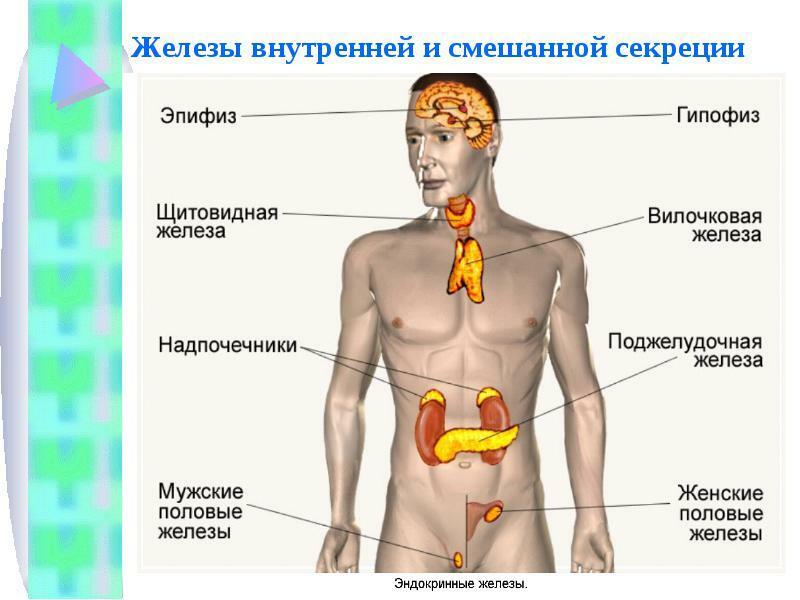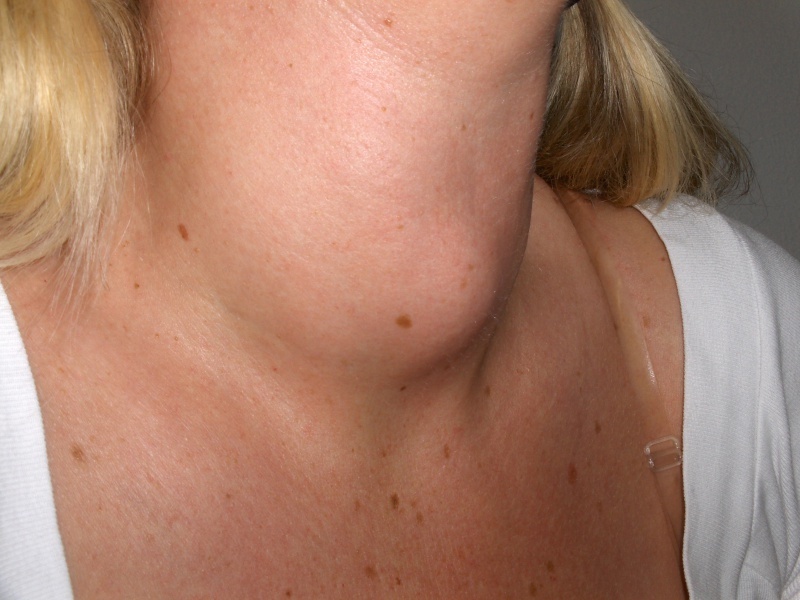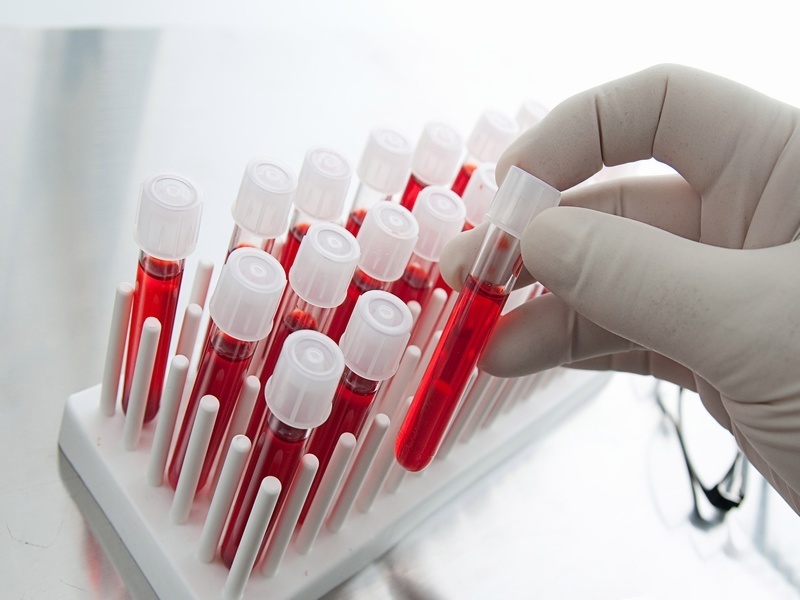Endocrine diseases are numerous and diverse, and their course and symptoms are often unpredictable. About how to determine the disease of endocrine organs and their specificity we will talk in this article.
Contents of
- Main diseases of the endocrine system, list of
- Video: Endocrine system diseases
- Endocrine diseases symptoms
- Endocrine disease risk factors
- Diagnosis of endocrine system diseases
- What are hereditary diseases of the endocrine system?
- Infantile diseases of the endocrine system
- Diseases of the endocrine system during pregnancy
- Endocrine system tests
- Consequences of endocrine diseases
- Video: What endocrine diseases can cause infertility?
Endocrine system performs the most important function - regulates the work of internal organs through the development of special substances - hormones .
Often in the work of this large and important system failures occur and then there are endocrine diseases. What are the diseases of the endocrine system, how do they flow and what consequences do you get from this article.
The main diseases of the endocrine system, the list of
Hormones play a huge role for - they affect the physical parameters of a person, his psychoemotional state and physiological processes.
If the work of the endocrine system is broken for some reason, then develops pathological processes in which:
- disrupts the process of producing hormones
- hormones are produced in a reduced or increased amount of
- processes of transport or absorption of the hormone
- are disrupted an abnormal hormone
- is produced resistance against hormonalactions
 Endocrine system
Endocrine system Any similar failure in the endocrine system leads to the development of the disease. Allocate the most common endocrine system diseases:
- Hypothyroidism is a disease caused by hypothyroidism of the thyroid gland when an insufficient amount of hormones is produced. The disease is characterized by a slowing down of metabolic processes, which leads to a number of symptoms, which at the initial stage are written off for normal fatigue. Hypothyroidism affects women more often than men - in women, the disease is observed 19 times more often.
- Diabetes mellitus is a disease that develops against the background of a complete or partial insufficiency of insulin, which leads to disruption in metabolic processes. Fats, proteins and carbohydrates are poorly absorbed, incomplete splitting of glucose occurs, which causes hyperglycemia. This leads to concomitant symptoms of diabetes mellitus and complications of
- Zob- thyroid hormone production disorder( its hypo- or hyperfunction), accompanied by dysplasia( an increase in size that is not related to the onset of the tumor).The most common cause of goiter is a lack of iodine, which is necessary for the proper functioning of the thyroid gland.
- Thyrotoxicosis is a hyperthyroidism of the thyroid gland. Many organs and systems because of the excess of thyroid hormones change their work, which leads to a number of specific symptoms of
- Autoimmune thyroiditis - destructive changes in thyroid tissues caused by malfunction of the immune system, in which immune cells destroy thyroid cells, perceiving them forforeign agents
- Hypoparathyroidism - hypothyroidism of the parathyroid glands, which is expressed in the occurrence of seizures with convulsions
- Hyperparathyroidism - excess steam productiontgormona that produce parathyroid glands. Accompanied by a violation of the exchange of certain trace elements
- The gigantism of is an excessive production of growth hormone, which leads to an increased but proportionate development of the body. In adults, the hyperfunction of this hormone provokes an increase in the size of individual parts of the body.
Video: Endocrine system diseases
Endocrine diseases symptoms
The endocrine system includes the all endocrine glands , so endocrine diseases have a wide range of very diverse symptoms.
Some signs of these pathological conditions are often written off for fatigue, stress or overeating, while the disease begins to progress.
The most common symptoms of endocrine diseases:
- fatigue, muscle weakness
- abrupt weight change( its set or losing weight with a constant diet)
- heart pain, palpitation
- fever, sweating
- unnatural excitability
- drowsiness
- rapid urination
- constant thirst
- increased pressure, accompanied by headaches
- memory impairment
- diarrhea
 Endocrine diseases for a long time can maskovatsya under other diseases
Endocrine diseases for a long time can maskovatsya under other diseases Symptoms of endocrine diseases is mixed - the patient may suspect a variety of diseases.
Only a professional approach to treatment and the delivery of a blood test for hormones will help dot the "i" and establish the true cause of the ailment.
Risk factors for endocrine diseases
Endocrine diseases can occur quite unexpectedly for the patient, and may be quite expected. So, there are certain groups of people who have the propensity of to some kind of infirmities of the endocrine system.
Specialists identify for such risk factors:
- Age - the most frequently failures of the endocrine glands are people who have crossed the 40-year boundary
- Hereditary predisposition - many diseases of the endocrine system are "transmitted" by inheritance, for example, often diabetes is observed in both parents and children
- Overweight - Over 80% of obese people face problems in the functioning of endocrine glands
- Malnutrition - an unbalanced diet leads to malfunctions in the work of manyorgans and systems - endocrine is not an exception
- Harmful habits - it is scientifically established that both alcohol and tobacco negatively affect the endocrine glands
- Decreased physical activity - people who move little have a slow metabolism, excess weight and poor blood supply of the endocrine glands, which affects their work
 Obesity, improper diet and low mobility can provoke a malfunction in the endocrine system
Obesity, improper diet and low mobility can provoke a malfunction in the endocrine system Thus, the development of endocrine diseases have a predisposition for many. But if nothing can be done about heredity and age, then all other factors can easily be changed and protects one's health.
Diagnosis of endocrine system diseases
To determine the presence of an endocrine disease, can only be an endocrinologist, therefore do not try to diagnose yourself, let alone prescribe any treatment.
In determining the malfunction of the endocrine glands, such diagnostic methods are effective:
- External examination - already at the first admission the doctor can determine the presence of an endocrine disease according to the external condition of the patient: this will indicate the skin condition, proportionality of parts of the body, skin pigmentation in various places, an increase in the thyroid gland, atypical ovolosenie
- Palpation - if there are no visible signs of the disease, then the development of such a disease as goitre can the doctorGödel to probe
- thyroid blood test for sugar and hormones - the most significant method of diagnosis. A change in the normal level of hormones in the blood will give the specialist reason to assume that there is a disease, and the attendant symptoms will help to establish the exact cause.
- US
 Thyroid palpation
Thyroid palpation In addition to the basic methods of diagnosing endocrine diseases, the doctor can also use additional ones such as:
- X-ray study
- computed tomography
- auscultation
What are the inherited diseases of the endocrine system?
Many endocrine diseases arise due to mutational processes in the genes .Such a mutation becomes a hereditary factor that is transmitted from generation to generation. Excrete such hereditary diseases of the endocrine system:
- Pituitary anatomy - insufficient production of pituitary hormones, resulting in the development of dwarfism and insufficient sexual development
- Diabetes mellitus ( both insulin-dependent form and insulin-independent)
- Adrenogenital syndrome - inadequate production of corticosteroids and excessivedevelopment of other
- Hypoterisis - if a woman during pregnancy does not control the level of thyroxine prand gipoterioze, it can be transmitted to her child
 If both parents have diabetes, the risk of the child's disease is 25%
If both parents have diabetes, the risk of the child's disease is 25% The listed diseases are not necessarily are diagnosed immediately at birth .Some of them may appear throughout life and even in old age.
Infantile diseases of the endocrine system
The endocrine organs of the child constitute a fragile system that can fail if exposed to adverse factors.
As the child's body grows and develops, the endocrine glands change with it, and negative effects from outside for a long time may not exert their influence due to specific mechanisms of endocrine compensation.
Compensation mechanisms protect the body for a certain period of time and can be neutralized at any time, which will result in the development of the endocrine disease of .
 Survey of a child by an endocrinologist
Survey of a child by an endocrinologist The most common diagnoses for in children are endocrine diseases:
- Diabetes mellitus is the most common endocrine system disease in children. Of the 70 million people with diabetes worldwide, 10% are children
- Giantism - non-standard growth rates of the child or individual parts of the body, caused by the action of hormones. Most clearly manifested in adolescence, but it can make itself felt before
- Brain gigantism - accelerated growth of the child during the first 4-5 years of life, caused by cerebral disorders
- Dwarfism - slow growth of the child due to dysfunction of the pituitary gland. The main causes of failure in the work of this department of the brain is heredity or development of the tumor
- Disease of the Itenko-Cushing is a pathology of the adrenal glands in which excessive production of active substances - glucocorticoids - occurs. The child develops obesity and high blood pressure.
- Hypoteriasis
- Hyperthyroidism
- Goiter
 Giantism of the hands in the child
Giantism of the hands in the child Treatment of endocrine diseases in children is aimed at maintaining vital processes and functions if the disease is incurable or for condition correction.
Diseases of the endocrine system during pregnancy
It used to be that pregnancy and endocrine diseases are incompatible. Today the medicine has stepped forward and a woman with diabetes or hypothyroidism can become the mother of if she follows her health and follow the doctors' instructions.
Pregnancy in hypothyroidism:
- Before the pregnancy planning the woman should enter the condition of the
2. When the pregnancy has occurred, the doctor should increase the dose of levothyroxine, usually 50% of the usual
3. The endocrinologist should controla woman's condition throughout the period of pregnancy
4. Is shown iodoterapy
 It is important to discuss with a doctor whether pregnancy is possible with endocrine disease
It is important to discuss with a doctor whether pregnancy is possible with endocrine disease Pregnancy in sugariabete:
- pregravid Careful preparation
2. Achieving disease compensation
3. Frequent monitoring of insulin, a permanent correction of its doses
4. Specialized assistance in childbirth
woman with diabetes mellitus should be aware of all the risks associated with pregnancy such a complex disease.
Miscarriages often occur, the baby is born dead or after birth it needs special care in order to save life. Do not forget also that diabetes is inherited by and there is a high probability that it will occur in your child.
Thyrotoxicosis and pregnancy:
A woman in the position can continue thyreostatic treatment of - this will not have a harmful effect on the fetus. Compulsory control of the endocrinologist and early registration.
 Often taking medications to correct the endocrine glands during pregnancy does not stop
Often taking medications to correct the endocrine glands during pregnancy does not stop Thyroid cancer in pregnancy:
In such a disease, is a mandatory surgical intervention, recommended for 20-24 weeks of fetal development .If the tumor does not progress, then its removal can be carried out after childbirth.
Important: For serious endocrine diseases, should be considered for the possibility of pregnancy with .
If conception has already occurred, then should be registered as early as possible in the women's consultation - this will help to save the child's life and your health.
Endocrine system diseases tests
- Endocrine diseases are diverse and very often difficult to diagnose
- This is because most of the endocrine glands other than the thyroid and testicles can not be palpated or examined
- In addition, the blood test for hormones showstheir concentration, but does not say anything about their metabolism, which is extremely important to know for diagnosing
 For diagnosing an endocrine disease it is important to pass a blood test
For diagnosing an endocrine disease it is important to pass a blood test For a diagnosis tests are carried out:
- radioimmunoassay
- for hormones( determination of blood hormones content)
- for sugar( blood, urine)
- glucose tolerance test
Remember that before passing any analysis it is necessary for to adhere to certainrules , which you can check with your doctor. If they are not observed, the results of the analysis may be false.
Consequences of endocrine diseases
hormones play an important regulatory role in the body and if their production is impaired, this can have very different negative consequences for the body.
First of all, the work of many internal organs, metabolic processes, function of the internal secretion glands is disrupted, there are somatic disorders and cosmetic defects.
 At the slightest suspicion of endocrine disease, consult a doctor
At the slightest suspicion of endocrine disease, consult a doctor - People with endocrine diseases, sometimes become hostage to their condition. Constant admission of drugs, hormones, maintenance therapy sometimes become lifelong
- In addition to the underlying disease, there are often accompanying ones that further worsen the state of health and the condition of the patient
- Endocrine diseases must be treated, but if the cure is impossible, then always possible correction of the condition and its relief bydifferent preparations
- Do not forget that their appointment in the competence of only endocrinologist and should not exacerbate the state of self-medication
Take care of your health!
